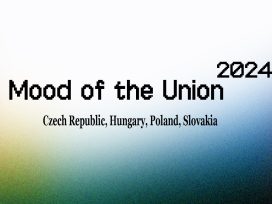You can’t lose democratic elections if they don’t exist
It would have taken a miracle for Viktor Orbán to lose the election. Hungary is a fortified kleptocracy where the ruling party has captured the state and controls 80% of the media. It certainly didn’t help that the opposition’s campaign failed to deliver a post-illiberal vision.
With the world reeling from news of massacres on Kyiv’s outskirts, Viktor Orbán named the Ukrainian president among his enemies on 3 April when celebrating his fourth election victory in a row. The Hungarian leadership may have been pressured into pro forma siding with the EU and NATO mainstream in the early days of Russian aggression, but, in their own universe, they have never stopped blasting hardcore pro-Putin propaganda.
Many election irregularities were reported, from burnt postal ballots and chain voting to bribing voters. Authorities also denied investigating irregularities beyond Hungary’s borders, effectively leaving absentee votes from neighbouring countries open for interference. And yet, even without clear cases of fraud and voter suppression, the Hungarian elections wouldn’t be a fair democratic contest, as OSCE observers also confirm. Whether or not concrete electoral regulations stand up to the test, one must look at how the government controls media, economy and society at large for the full picture.
Molten in concrete and public funds
Fidesz has fortified its position with every possible tool since 2010. Now the party directly controls over 80% of Hungary’s media, leaving much of the population without an alternative. The regime utilizes debilitating poverty to operate a feudal-style chain of dependence in rural communities through a postmodern workhouse system (közmunka, publicly funded labour for a poverty-line wage being the only possible income in many localities), which is an important factor in cases of voter intimidation. Activists have been campaigning against these and other forms of voter suppression for years, and despite the regular reports, the phenomena don’t seem to disappear.
Fidesz first rode the wave of discontent into a supermajority 12 years ago, after the collapse of the scandalously corrupt socialist party MSZP met the outrage of the 2008 financial crisis. This exceptional opportunity allowed Fidesz to rapidly rewire the country’s workings: using their command of over 2/3 of parliamentary mandates, governing politicians changed the electoral system in favour of the majority in power and fragmented the opposition; they established a new media law allowing the government to capture publicity without legal consequences; and they wrote a new constitution, turning a pluralist parliamentary democracy into a centralized hybrid regime with some small democratic ornamentation, which ultimately killed off most self-governance and fair representation.
This regime has systematically devoured all social spheres and clamped down on independent operations in every sector. Municipalities have been stripped of their incomes, budgets and assets, and most of their autonomy, to suffocate opposition figureheads trying to build a name locally. Public education has been hypercentralized, resulting in steadily worsening performances and shortages of all kinds, especially of labour.
When teachers finally decided to act this year, they were denied their right to strike; many have been on a wild strike for weeks. University autonomy has been brutally crushed: major institutions have been effectively privatized and consolidated under an ideologically vetted holder, for whom the legal guarantees expected of public institutions do not apply. The public health system has been bled dry, the collapse of which has shown disastrous results in the pandemic.
The Hungarian economy is dependent on two unkind masters: German heavy industry and cheap Russian energy. The labour code has minimized workers’ rights and the lack of opportunities pits everyone against one another. Social mobility has been in decline for decades: more than 2 million out of 9.75 million people now live below the poverty line in Hungary. Self-sustaining industry is scarce. It’s becoming rarer to see any that remain untouched by oligarchs, whose latifundia exceed those of the nineteenth century.

Yet unused ballot from the 2022 Hungarian elections, featuring, among others, the Two-tailed Dog Party, a joke formation who achieved over 3% on its national list. Photo by Angéla Vaszkó from 3 April 2022.
Don’t even try to scandalize
Scandals don’t shake this regime because its grip on publicity is extremely tight. In government-controlled media, unfavourable topics won’t even get a mention, thus avoiding any potential confusion among their supporter base. In Fideszland, Ukraine is found responsible for the Russian invasion; opposition politicians and an imaginary international plutocracy are scheming to distort the peace and unity of a fictitious ever-growing economy. State-sanctioned propaganda paints the country as a tranquil and benevolent fairyland that, incidentally, is always under lethal threat from the outside; open hate-mongering comes as standard.
For non-Hungarian speakers, here’s a quick recap of the news the day before the election – click in for the thread.
One day till the elections in 🇭🇺. Let’s watch the news together! pic.twitter.com/rWRlaynskI
— VKJudit (@VKJudit) April 2, 2022
A tragicomic example of the hermetically closed discourse was set when the public broadcaster, one of many shameless propaganda channels, gave into pressure and allowed opposition candidates a single five-minute slot to present their election pledges. That is a total of five-minutes airtime over four years.
Days before the election, news broke that Russian intelligence services have long had access to the Hungarian Foreign Ministry’s internal communications. And, although the ministry was reportedly aware of the cyber-attacks, they never enforced any consequences. The attacks were carried out by hacker communities linked to both the FSB and the GRU military intelligence service. In a country with even a semblance of a functioning media, no government could withstand a scandal of this scale. But in Fideszland, this news doesn’t exist – it never even received a mention.
Only a few weeks earlier, another scandal broke about two high-ranking government officials. The right-hand men of the Minister of Justice and the Minister of Government Communication (or rather, the Minister of Propaganda) were embroiled in a scheme that involved buying fake law exam results from respectable universities, and high profile real estate speculation that involved state bailiffs and members of the judiciary. The news was based on leaked documents from an official prosecution, one which suspiciously stopped just below the ministerial level. Neither of the ministers reacted to the scandal and no word was uttered in the Fidesz media empire.
One is reminded of Nikolay Koposov’s hypothesis on why Russian national interest doesn’t exist:
To have interests, a nation (or any group of people) must have subjectivity, which the Russians as a nation do not have under the current regime.
Having subjectivity here means being free to make rational and responsible decisions. The acquisition and possession of subjectivity entail several things. First, the group must have access to relatively reliable information. Second, it should be able to openly discuss its situation, formulate various action plans, and promote them in the public space. And third, it must have agreed-upon decision-making mechanisms to determine which plan is the best.
None of these exists in Putin’s Russia.
Although poisoning or shooting down political opponents is yet relatively rare in Hungary, the above-outlined prerequisites of a nation’s subjectivity are largely lacking there too, faithfully following the Kremlin’s recipe to the extent that an EU member state can afford.
Kill the poor
In its 12 years of political tango, this regime has attacked every vulnerable group and lied about just about everything. They have waged operetta wars on homeless people, on independent NGOs, refugees and asylum seekers. They play to antisemitic tunes daily in naming George Soros as a chief enemy. And, since the pandemic started, outright homophobia has been the main rallying cry.
The Russian invasion caught Orbán unaware, but, after some initial flip-flopping, the official rhetoric settled on a blend of fake pacifism, barely veiled pro-Putin propaganda and racism against ‘not the right kind of’ refugees. Ukraine is suspected of dragging Hungary into war and, since his direct address to Orbán, Volodymyr Zelensky has been named as a threat to Hungarian independence.
It’s important to keep in mind, however, that the very nature of such adaptive propaganda machines requires no consistency in message. It works through its sheer force and volume, leaving not a single breath to independent voices. On channels it doesn’t entirely control, such as social media, it operates by creating noise and out-advertising everyone else. These are, indeed, textbook Putinist methods financed via EU resources. In a recent analysis, the Corruption Research Center Budapest has found that 42 firms owned by merely 12 Fidesz-related businessmen have won 21 percent of EU funded public contracts between 2011 and 2021. The list includes a number of communication and media enterprises, too.
At the core of this propaganda machine lie two consistent values that Fidesz never abandons: a deeply entrenched, flaming hatred for any form of autonomy, and clear disdain for the poor. These appeal to the worst reflexes of Hungarian political culture: extreme individualism that pits social groups against one another, cynicism that prevents positive collaborations and strategically disastrous conflict avoidance. As the Hungarian saying goes, felfelé nyal, lefelé tapos (lick upwards and kick downwards).
These conditioned modes of behaviour formed the basis of the Socialist social contract with János Kádár’s murderous regime that offered some improvements in quality of life in exchange for never mentioning the bloodshed of 1956; they are the same political reflexes curated and encouraged by the Habsburgs during their absolutist reign over Hungary for centuries.
Hungarians aren’t exclusively a petty backstabbing collective, of course. But the current political rule consciously punishes autonomy and rewards spineless servitude. Individual morality has a hard time having to work against this backdrop.
Saving on the footwork
In this environment, it would have taken two and a half miracles for any opposition coalition to win against the incumbent government. This regime is fortified and will not fall via democratic elections – first and foremost because proper democratic elections no longer take place in Hungary. It will only fall when Viktor Orbán does – a leader who keeps their own cadres in perpetual uncertainty and strikes down any attempt of independent action, even among his own ranks. Whether the EU’s criminally belated step to slash funding due to rule of law violations will loosen Orbán’s grab on power is hard to determine. It certainly would have had an important preventative effect on this political enterprise at earlier stages of its brutal conquest.
Viktor Orbán’s political machinery is focused on two objectives, and no more: channelling wealth into its own circles and fortifying its position in power. It spectacularly fails at everything else: social institutions are in ruins, proven yet again by the madness of a criminally mismanaged pandemic and the collapse of public education.
But to stay in power, all Fidesz needs is the lack of a viable alternative. And here, the failure of the united opposition is spectacular. Civil society achieved an unprecedented pre-election mobilization, forging a united opposition bloc with independent election observers in every district – these are feats unheard of in Hungarian politics. But once the ball was in the political opposition’s court, they wasted the opportunity.
It was always going to be impossible to beat state-sanctioned propaganda blasted 365 days a year with only a few months of campaigning. But after successful primaries, the new alliance barely campaigned for months, was poorly coordinated and kept undermining their own collaboration.
The political opposition in Hungary still hasn’t learnt the most important lesson: that full-time and permanent community organization is the basis of any functioning political movement. There are no rhetorical shortcuts, communication miracles, no technological solutions that could make up for the lack of consistent involvement of the electorate. It would also help if someone contested a regime built on hating the poor by addressing social questions – a hot potato that even most actual leftist politicians tend to shy away from.
This editorial is part of our 6/2022 newsletter. Subscribe to get the weekly updates about our latest publications and reviews of our partner journals.
Published 5 April 2022
Original in English
Newsletter
Subscribe to know what’s worth thinking about.
Related Articles

Prefiguring Europe’s future
Czech Republic, Hungary, Poland, Slovakia
Since the war in Ukraine, the Visegrád Four group no longer articulates a common voice in the EU. Even the illiberal alliance between Hungary and Poland has come to an end. Yet in various ways, the region still demonstrates to Europe the consequences of the loss of the political centre.

Pronatalism has become a populist vote winner for right-wing parties in Central and East European countries. Demographic imbalances, involving youth migration, ageing populations and immigration resistance, have sparked a series of baby-making policies. But are financial incentives in Hungary, Poland and Serbia enough to reverse the trend of decreasing birth rates?








